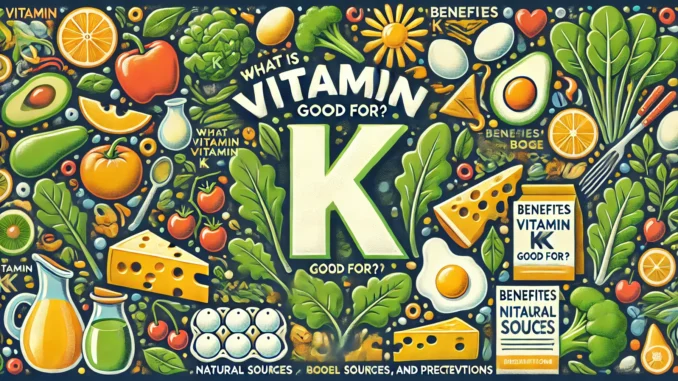
What is Vitamin K Good For? Natural Sources, Uses, and Alerts
Introduction
Vitamin K may not be as famous as vitamin C or “D” but it plays an essential role in keeping your body healthy. Known primarily for its part in blood clotting, Vitamin K is crucial for several bodily functions that we might take for granted. From strengthening bones to supporting heart health, Vitamin K is one of those hidden gems that deserve a closer look. This article will explore what Vitamin K is, why it’s essential, natural sources, uses, and necessary precautions. Let’s dive in!
What is Vitamin K?
Vitamin K is a fat-soluble vitamin that your body needs for proper functioning. There are two main types: Vitamin K1 (phylloquinone), found in plants, and Vitamin K2 (menaquinone), found in animal products and fermented foods. These vitamins are crucial for producing proteins involved in blood clotting and bone metabolism.
Why is Vitamin K Essential?
Why should you care about Vitamin K? Simply put, it plays a critical role in blood clotting and bone health. It helps your body manage bleeding, heals wounds faster, and keeps your bones strong and healthy. Without enough Vitamin K, even a small cut can lead to excessive bleeding, and your bones might not get the calcium they need.
The Types of Vitamin K
Vitamin K1 (Phylloquinone)
Vitamin K1 is mainly found in green leafy vegetables like spinach, kale, and broccoli. It is primarily responsible for blood clotting, helping your body to control bleeding when you get a cut or injury.
Vitamin K2 (Menaquinone)
Vitamin K2 is found in animal products like meat, cheese, and eggs, as well as fermented foods like natto. It supports bone and heart health by helping direct calcium to the right places in your body—such as your bones—while preventing it from building up in your arteries.
How Does Vitamin K Help with Blood Clotting?
Ever wondered why you don’t bleed endlessly from a small cut? That’s thanks to Vitamin K. This vitamin plays a crucial role in synthesizing proteins that control blood clotting. These proteins help form clots to stop bleeding which is why Vitamin K is often called the “blood clotting vitamin.”
Bone Health and Vitamin K
Did you know that Vitamin K is a key player in bone health? It works hand-in-hand with calcium, aiding in its absorption and keeping your bones strong. Vitamin K activates a protein called osteocalcin, which helps bind calcium to your bones, increasing bone density and reducing the risk of fractures.
Cardiovascular Benefits of Vitamin K
Heart health is another area where Vitamin K shines. It prevents calcium from accumulating in the arteries, which can lead to hardening—a risk factor for heart disease. Keeping your arteries flexible and clear is one of Vitamin K’s many unsung benefits.
Vitamin K and Skin Health
From reducing bruising to helping heal scars. Vitamin K is beneficial for your skin. It has anti-inflammatory properties that can help, with various skin conditions making it a favorite in some skincare routines.
Natural Sources of Vitamin K
Plant-based Sources
- Spinach
- Kale
- Broccoli
- Parsley
- Green Beans
Animal-based Sources
- Egg Yolks
- Liver
- Cheese
- Butter
- Fermented Foods (like natto)
How Much Vitamin K Do You Need?
The amount of Vitamin K you need depends on your age and gender. Generally, adult men require about 120 micrograms per day, while adult women need around 90 micrograms. These requirements can vary, especially if you have specific health conditions or are taking certain medications.
Signs of Vitamin K Deficiency
A lack of Vitamin K can lead to several symptoms:
- Excessive bleeding or bruising
- Frequent nosebleeds
- Heavy menstrual periods
- Weak bones or osteoporosis
- Delayed wound healing
How to Increase Your Vitamin K Intake
To boost your Vitamin K intake consider incorporating more green leafy vegetables into your diet. Foods like spinach, kale, and broccoli are fantastic sources. Vitamin K2-rich foods like cheese, and eggs can help if you’re not a fan of veggies. Supplements are also an option, but it’s best to consult a healthcare provider before starting.
Potential Side Effects and Precautions
Although Vitamin K is generally safe, it can interact with medications, especially blood thinners like warfarin. Too much Vitamin K can interfere with these medications, making them less effective. Always consult a doctor before taking Vitamin K supplements, especially if you are on medication.
Who Should Be Cautious About Vitamin K?
Certain individuals need to monitor their Vitamin K intake:
- People on blood thinners
- Pregnant women (should follow their doctor’s advice)
- Individuals with kidney disease or other health conditions
Conclusion
Vitamin K may not be the star of the vitamin world, but its role in blood clotting, bone health, and heart function is undeniable. You can support your overall health by understanding its importance and incorporating Vitamin K-rich foods into your diet. Remember, a balanced diet and consult with a healthcare professional are the best ways to ensure you get the right amount of Vitamin K.
FAQs
1. What foods are highest in Vitamin K?
Green leafy vegetables like spinach, kale, and broccoli are some of the richest sources of Vitamin K.
2. Can you have too much Vitamin K?
Yes, excessive Vitamin K can interfere with blood-thinning medications. It’s best to follow the recommended guidelines.
3. Is Vitamin K safe during pregnancy?
Vitamin K is generally safe during pregnancy, but it’s important to consult your healthcare provider for personalized advice.
4. How does Vitamin K interact with medications?
Vitamin K can decrease the effectiveness of blood thinners like warfarin, so monitoring intake is crucial if you’re on such medications.
5. Does cooking affect Vitamin K content in foods?
Yes, cooking can reduce Vitamin K levels, especially in green vegetables. Steaming or microwaving may preserve more of the vitamin compared to boiling.

Leave a Reply